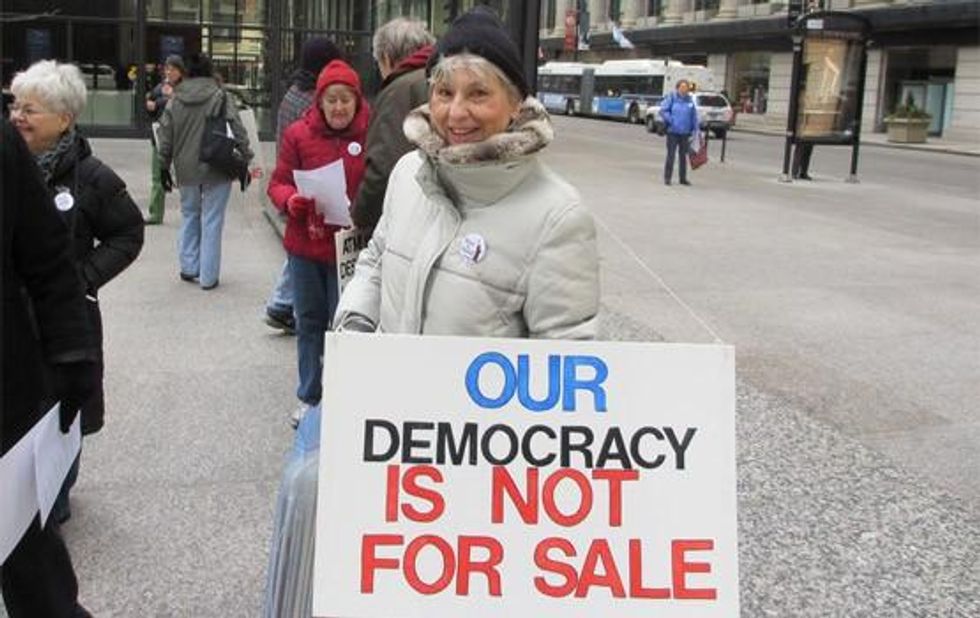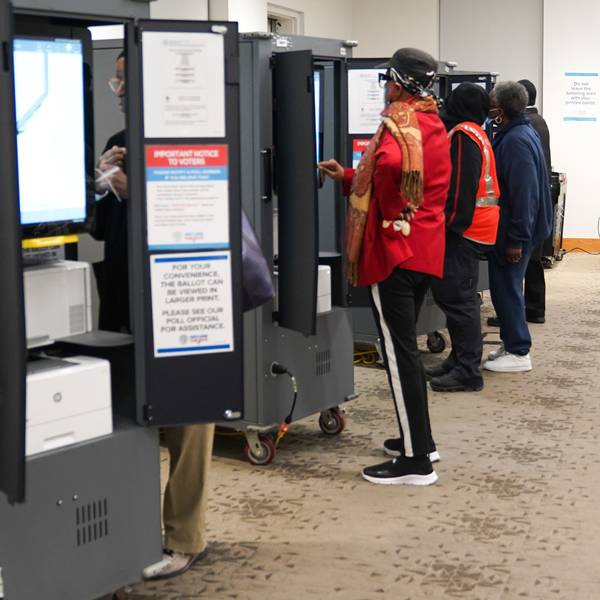The Last of the Big Money Elections?
The movement to overturn Citizens United might just make 2012’s record election spending into the end of an era.

One reason this is so exciting is that Montana, a red state that voted for Romney by 13 points, and Colorado, a swing state, are part of a growing movement in the United States to make an amendment happen. In fact, our country is now one quarter of the way to making it a reality.
As prescribed in Article V of the Constitution, the amendment process requires a two-thirds vote by both chambers of Congress, followed by ratification by three-quarters of the states. Today, three years after the infamous Supreme Court ruling, we're closer than ever to hitting those magic numbers of 67 senators, 290 representatives and 38 states.
Here's the rundown. In Congress, 24 returning senators and 73 returning representatives have introduced or co-sponsored amendments to overturn Citizens United. On the state side, Montana and Colorado have become the 10th and 11th states to formally call for an amendment, and are the first to do so through a statewide popular vote. Voters in both these states approved their measures by margins of nearly three to one.
Other states have used different means. Hawaii, New Mexico, Vermont, Rhode Island, California, Massachusetts, and New Jersey acted through their legislatures, passing formal resolutions calling for an amendment. In Connecticut and Maryland, majorities of state legislators signed letters to the U.S. Congress with the same request.
The movement has been growing at the local level, too. More than 350 cities, towns, and counties across the United States have called for an amendment, including New York City, Los Angeles, Chicago, and Philadelphia, and more than 2,000 elected officials nationwide are on record supporting one.
The movement to overturn Citizens United may well have arrived at a tipping point. Polling shows overwhelming public support for overruling the decision through the constitutional amendment process, as well as extraordinary support for limiting the amount of money corporations, unions and other groups can spend in elections. The support also cuts across party lines. Just look at Montana, a state that has only supported a Democratic presidential candidate once since 1968, but nonetheless resoundingly called for a constitutional amendment this November.
So while a record-breaking six billion dollars was indeed spent in last year's election, it remains to be seen whether that number will be remembered as historic because it marked the beginning of a new age of big money in politics, or the beginning of its end.
Given the enormous progress the nation has made toward a constitutional amendment in such a short time, it's possible that the 2012 election will actually mark the ascendency of the national movement to take back our democracy.
An Urgent Message From Our Co-Founder
Dear Common Dreams reader, The U.S. is on a fast track to authoritarianism like nothing I've ever seen. Meanwhile, corporate news outlets are utterly capitulating to Trump, twisting their coverage to avoid drawing his ire while lining up to stuff cash in his pockets. That's why I believe that Common Dreams is doing the best and most consequential reporting that we've ever done. Our small but mighty team is a progressive reporting powerhouse, covering the news every day that the corporate media never will. Our mission has always been simple: To inform. To inspire. And to ignite change for the common good. Now here's the key piece that I want all our readers to understand: None of this would be possible without your financial support. That's not just some fundraising cliche. It's the absolute and literal truth. We don't accept corporate advertising and never will. We don't have a paywall because we don't think people should be blocked from critical news based on their ability to pay. Everything we do is funded by the donations of readers like you. Will you donate now to help power the nonprofit, independent reporting of Common Dreams? Thank you for being a vital member of our community. Together, we can keep independent journalism alive when it’s needed most. - Craig Brown, Co-founder |

One reason this is so exciting is that Montana, a red state that voted for Romney by 13 points, and Colorado, a swing state, are part of a growing movement in the United States to make an amendment happen. In fact, our country is now one quarter of the way to making it a reality.
As prescribed in Article V of the Constitution, the amendment process requires a two-thirds vote by both chambers of Congress, followed by ratification by three-quarters of the states. Today, three years after the infamous Supreme Court ruling, we're closer than ever to hitting those magic numbers of 67 senators, 290 representatives and 38 states.
Here's the rundown. In Congress, 24 returning senators and 73 returning representatives have introduced or co-sponsored amendments to overturn Citizens United. On the state side, Montana and Colorado have become the 10th and 11th states to formally call for an amendment, and are the first to do so through a statewide popular vote. Voters in both these states approved their measures by margins of nearly three to one.
Other states have used different means. Hawaii, New Mexico, Vermont, Rhode Island, California, Massachusetts, and New Jersey acted through their legislatures, passing formal resolutions calling for an amendment. In Connecticut and Maryland, majorities of state legislators signed letters to the U.S. Congress with the same request.
The movement has been growing at the local level, too. More than 350 cities, towns, and counties across the United States have called for an amendment, including New York City, Los Angeles, Chicago, and Philadelphia, and more than 2,000 elected officials nationwide are on record supporting one.
The movement to overturn Citizens United may well have arrived at a tipping point. Polling shows overwhelming public support for overruling the decision through the constitutional amendment process, as well as extraordinary support for limiting the amount of money corporations, unions and other groups can spend in elections. The support also cuts across party lines. Just look at Montana, a state that has only supported a Democratic presidential candidate once since 1968, but nonetheless resoundingly called for a constitutional amendment this November.
So while a record-breaking six billion dollars was indeed spent in last year's election, it remains to be seen whether that number will be remembered as historic because it marked the beginning of a new age of big money in politics, or the beginning of its end.
Given the enormous progress the nation has made toward a constitutional amendment in such a short time, it's possible that the 2012 election will actually mark the ascendency of the national movement to take back our democracy.

One reason this is so exciting is that Montana, a red state that voted for Romney by 13 points, and Colorado, a swing state, are part of a growing movement in the United States to make an amendment happen. In fact, our country is now one quarter of the way to making it a reality.
As prescribed in Article V of the Constitution, the amendment process requires a two-thirds vote by both chambers of Congress, followed by ratification by three-quarters of the states. Today, three years after the infamous Supreme Court ruling, we're closer than ever to hitting those magic numbers of 67 senators, 290 representatives and 38 states.
Here's the rundown. In Congress, 24 returning senators and 73 returning representatives have introduced or co-sponsored amendments to overturn Citizens United. On the state side, Montana and Colorado have become the 10th and 11th states to formally call for an amendment, and are the first to do so through a statewide popular vote. Voters in both these states approved their measures by margins of nearly three to one.
Other states have used different means. Hawaii, New Mexico, Vermont, Rhode Island, California, Massachusetts, and New Jersey acted through their legislatures, passing formal resolutions calling for an amendment. In Connecticut and Maryland, majorities of state legislators signed letters to the U.S. Congress with the same request.
The movement has been growing at the local level, too. More than 350 cities, towns, and counties across the United States have called for an amendment, including New York City, Los Angeles, Chicago, and Philadelphia, and more than 2,000 elected officials nationwide are on record supporting one.
The movement to overturn Citizens United may well have arrived at a tipping point. Polling shows overwhelming public support for overruling the decision through the constitutional amendment process, as well as extraordinary support for limiting the amount of money corporations, unions and other groups can spend in elections. The support also cuts across party lines. Just look at Montana, a state that has only supported a Democratic presidential candidate once since 1968, but nonetheless resoundingly called for a constitutional amendment this November.
So while a record-breaking six billion dollars was indeed spent in last year's election, it remains to be seen whether that number will be remembered as historic because it marked the beginning of a new age of big money in politics, or the beginning of its end.
Given the enormous progress the nation has made toward a constitutional amendment in such a short time, it's possible that the 2012 election will actually mark the ascendency of the national movement to take back our democracy.

